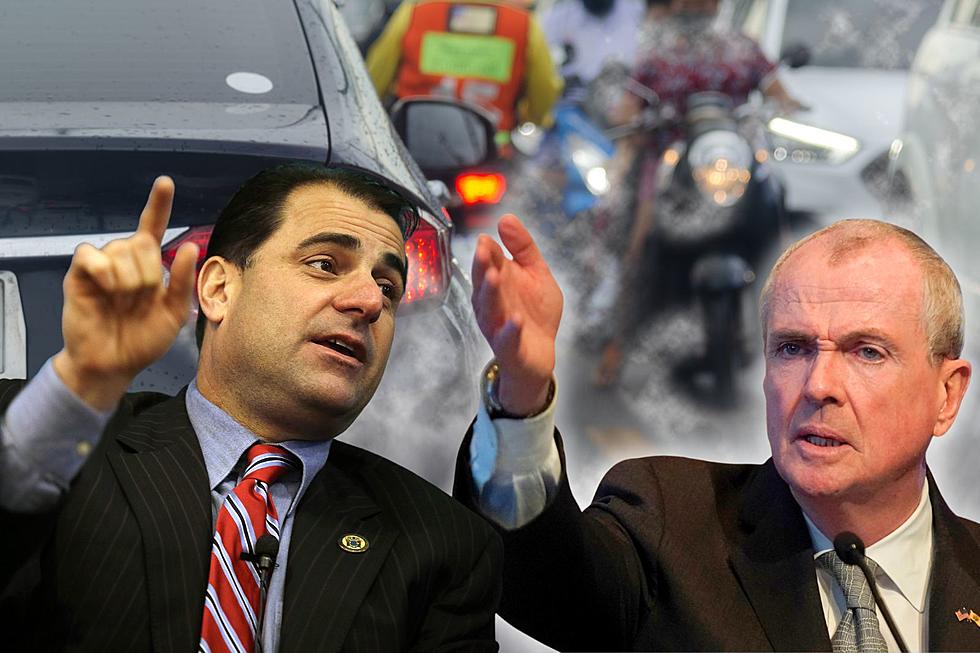
Even with gas tax hike, NJ would still add $12B in new debt
Overshadowed by the anger about the gas-tax hike is that the Transportation Trust Fund plan up being voted on Friday by the Legislature also calls for $12 billion in additional borrowing to bankroll construction.
Though the 23-cent-per-gallon hike in the gas tax would yield $1.2 billion a year, just $500 million is being used for what’s called "pay as you go" funding. The rest of the $2 billion a year in spending would be supported by $1.5 billion a year in borrowing for eight years to be repaid through gas taxes.
Come 2024, the TTF will have $27.5 billion in debt, up from the current $20 billion, and face annual payments of $2 billion, said Wall Street securities lawyer Peter Humphreys, who called the proposal unsustainable.
“All the money that’s in the new gas tax hike will all be soaked up by debt service. We’ll be back at square one. We’ll be back where we are now,” Humphreys said.
Assemblyman John Wisniewski, D-Middlesex, favors a 25-cent hike in the gas tax without any accompanying tax cuts, which he says would mean a permanent solution to transportation funding. Because of the tax cuts, lawmakers will face exactly the same issues in 2024 as today, he said.
“And we’re going to have an even greater public reaction, who are going to say, ‘We just gave you 23 cents a gallon, and you’ve now managed to spend through all of that?’” Wisniewski said. “I don’t think the public’s going to have an appetite to continue to do this.”
Defining "tax fairness," the elusive concept that drove the months-long impasse over transportation funding, as lawmakers sought to put together a package of vote-attracting tax cuts, isn’t easy.
Should it be done at the individual level? Everyone’s circumstances are different, but the impact of the 23-cent a gallon hike in the gas tax is pegged at AAA New Jersey at $170 per driver. Double it for a two-car family.
Given that the sales tax is being reduced by 3/8ths of a percent, and that items like clothing and groceries aren’t taxed, very few consumers will spend the $45,000 (or double that) to net a savings. The higher earned income tax credit leaves the working poor $50 short. Wealthy estates and high-income retirees would probably see a net benefit.
Here’s what it means at the big-picture, state-budget level: Not until 2025 will the cumulative value from the proposed tax cuts exceed the extra gas taxes, $1.2 billion a year, collected by New Jersey.
Each of the first three years, the extra tax collections exceed the value of the tax cuts, which are gradually ramped up. Taxpayers, as a group, come out ahead starting in 2020 but aren’t in the black overall until the ninth year after the tax cuts, 2025.
Incidentally, that’s a year after the state will have to figure out a new TTF plan.
“We’ll be in the same mess we are now. It’ll need to be fixed yet again in 2024,” Humphreys said. “They’ll have to have a new gas tax increase, or there will have to be some other funding found for it.”
The sales tax accounts for around 46 percent of the tax-cut package spread over 10 years. The elimination of the estate tax is the other big component, accounting for around 37 percent of the savings.
Sen. Paul Sarlo, D-Bergen, said ending the estate tax will keep well-to-do residents and small business owners from moving out of New Jersey after they retire.
“When you repeal the estate tax in New Jersey, one of two states that has both that and the inheritance tax, that’s a big thing,” Sarlo said. “It helps to keep a lot of business owners. It keeps a lot of folks. It helps to retain income, capital here in New Jersey. Hopefully these people will stay and continue to invest in New Jersey.”
The tax cut has its critics, who say it’s a sweetheart deal for the rich that will cost the state more than a half-billion a year in revenues. Franklin Lakes resident Eric Schoenberg, a member of the group Patriotic Millionaires that speaks against tax cuts favoring the rich, said it will increase inequality.
Schoenberg questioned why Democrats are so eager to go along with a priority of Republicans.
“The problem is the fecklessness of so many Democrats, who go along because they want to see something done and see no way around it,” Schoenberg said. “Ultimately, they too aren’t as perturbed because this doesn’t bother their donor base.”
Nine percent of the tax cuts are tied to exempting retirement income from taxes for couples with incomes of $100,000 or less, or single people with incomes under $75,000.
Six percent comes from increasing, to 35 percent of the federal level, the earned income tax credit for the working poor.
The remaining 2 percent comes from a new income-tax exemption for veterans.
New Jersey: Decoded cuts through the cruft and gets to what matters in New Jersey news and politics. Follow on Facebook and Twitter.
Michael Symons is State House bureau chief for New Jersey 101.5 and the editor of New Jersey: Decoded. Follow @NJDecoded on Twitter and Facebook. Contact him at michael.symons@townsquaremedia.com
More From New Jersey 101.5 FM









